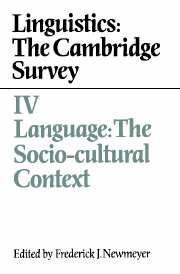Book contents
- Frontmatter
- Contents
- Contributors
- Preface
- 1 The study of language in its socio-cultural context
- 2 Language, culture, and world-view
- 3 Language and social class
- 4 Language and race: some implications for linguistic science
- 5 Language and gender
- 6 Bilingualism
- 7 Dialectology
- 8 Sociolinguistics and syntactic variation
- 9 Language birth: the processes of pidginization and creolization
- 10 Language death
- 11 Language planning: the view from linguistics
- 12 Ethnography of speaking: toward a linguistics of the praxis
- 13 The organization of discourse
- 14 Conversation analysis
- Index of names
- Index of subjects
- Contents of Volumes I, II, and III
14 - Conversation analysis
Published online by Cambridge University Press: 05 June 2012
- Frontmatter
- Contents
- Contributors
- Preface
- 1 The study of language in its socio-cultural context
- 2 Language, culture, and world-view
- 3 Language and social class
- 4 Language and race: some implications for linguistic science
- 5 Language and gender
- 6 Bilingualism
- 7 Dialectology
- 8 Sociolinguistics and syntactic variation
- 9 Language birth: the processes of pidginization and creolization
- 10 Language death
- 11 Language planning: the view from linguistics
- 12 Ethnography of speaking: toward a linguistics of the praxis
- 13 The organization of discourse
- 14 Conversation analysis
- Index of names
- Index of subjects
- Contents of Volumes I, II, and III
Summary
Introduction
Some of the very same qualities that make conversation an important topic for linguistic attention also make conversation a difficult topic for linguistic analysis. First, in having a conversation – something which we all do virtually every day – we draw upon our communicative competence (Hymes 1972): our tacit knowledge of the abstract rules of a language, which is required both to produce sound/meaning correspondences within grammatical sentences and to use those correspondences between sound, meaning, and form in socially and culturally appropriate ways. Such competence includes ‘the knowledge of linguistic and related communicative conventions that speakers must have to create and sustain conversational cooperation’ (Gumperz 1982a: 209). Despite the ubiquity of our communicative competence, however, neither the nature of that knowledge, nor the ways in which it can be put to use for social and expressive purposes, is readily accessible to our own introspection. Rather, such knowledge has to be inferred through the analysis of structures and patterns in that which it is able to produce, i.e. in conversation. The fact that inferences about what is causing a particular phenomenon have to be made through observation of its outcome is one reason why conversation is a difficult topic for linguistic analysis.
- Type
- Chapter
- Information
- Linguistics: The Cambridge Survey , pp. 251 - 276Publisher: Cambridge University PressPrint publication year: 1988
- 12
- Cited by



